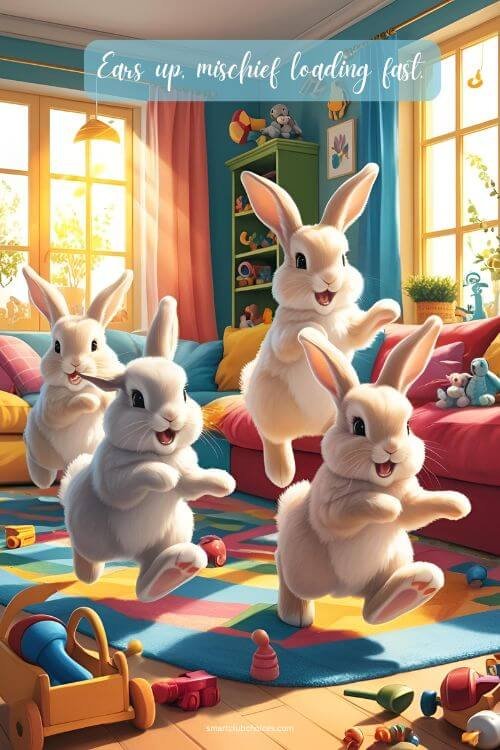Indoor vs. Outdoor: Which is Best for Your Bunny?
Bunnies are the ultimate combination of fluff, hops, and sass. Whether they’re zooming around your living room or nibbling on your favorite houseplant, these little furballs have a way of stealing your heart.
But when it comes to deciding where your bunny should live—indoors or outdoors—things can get a bit tricky.
Should your bunny be a cozy couch potato or a free-spirited garden explorer?
Both options have their pros and cons, and the decision ultimately depends on your lifestyle, your bunny’s personality, and your ability to provide a safe and happy environment.
So, let’s hop right into the great indoor vs. outdoor bunny debate!
Table of Contents
(1) The Case for Indoor Bunnies
Bunny-Proofing Your Home
Indoor bunnies are like tiny roommates who don’t pay rent but make up for it with cuteness. However, living with a bunny means you’ll need to bunny-proof your home. Here’s what that entails:
- Cable Chaos: Bunnies love to chew, and electrical cords are like gourmet snacks to them. Invest in cord protectors or hide cables out of reach.
- Furniture Fiascos: Your couch legs and baseboards might become chew toys. Use barriers or bitter sprays to deter your bunny from turning your furniture into confetti.
- Plant Problems: Many houseplants are toxic to bunnies, so make sure to keep them out of reach or opt for bunny-safe greenery.
The Benefits of Indoor Living
- Safety First: Indoor bunnies are protected from predators, extreme weather, and diseases carried by wild animals.
- Social Butterflies: Living indoors allows your bunny to be part of the family. They’ll bond with you, learn tricks, and maybe even snuggle on the couch (if they’re in the mood).
- Health Monitoring: It’s easier to spot changes in your bunny’s behavior or health when they’re living indoors.
The Downsides
- Messy Business: Bunnies can be messy. You’ll need to clean their litter box regularly and sweep up stray hay and fur.
- Space Requirements: Bunnies need plenty of space to hop, binky (their happy jump), and explore. A small cage won’t cut it—think bunny-proofed rooms or large playpens.

(2) The Case for Outdoor Bunnies
The Great Outdoors
Outdoor bunnies get to enjoy fresh air, sunshine, and the sights and sounds of nature. If you have a secure outdoor space, your bunny might thrive in an outdoor setup. Here’s what you’ll need:
- A Secure Hutch: Your bunny’s hutch should be sturdy, weatherproof, and predator-proof. Think of it as a bunny fortress.
- Run for Fun: Bunnies need space to exercise, so attach a large run to their hutch. Make sure it’s covered to protect them from birds of prey.
- Shade and Shelter: Provide plenty of shade and a cozy shelter for your bunny to retreat to during hot or rainy weather.
The Benefits of Outdoor Living
- Natural Environment: Outdoor bunnies get to experience the sights, sounds, and smells of nature, which can be enriching for them.
- More Space: If you have a large garden, your bunny can enjoy plenty of room to hop and explore.
- Less Mess Indoors: No need to worry about hay scattered across your living room or chewed-up furniture.
The Downsides
- Predator Risk: Even with a secure hutch, outdoor bunnies are at risk from predators like foxes, raccoons, and birds of prey.
- Weather Woes: Extreme heat, cold, or rain can be dangerous for bunnies. You’ll need to take extra precautions to keep them comfortable.
- Loneliness: Outdoor bunnies might feel isolated if they don’t get enough interaction with you or other bunnies.
(3) Health and Safety Considerations
Indoor Safety
- Temperature Control: Bunnies are sensitive to temperature changes. Keep your home at a comfortable temperature (around 60-70°F or 15-21°C).
- Toxic Hazards: Be mindful of household hazards like cleaning products, essential oils, and toxic plants.
- Exercise Needs: Even indoor bunnies need plenty of exercise. Set up a bunny-proofed play area where they can hop and explore safely.
Outdoor Safety
- Predator-Proofing: Make sure your bunny’s hutch and run are secure. Use strong wire mesh and locks to keep predators out.
- Weather Protection: Provide insulation for cold weather and shade for hot weather. Consider bringing your bunny indoors during extreme conditions.
- Health Checks: Outdoor bunnies are more prone to parasites and diseases. Regular vet check-ups are essential.
(4) The Social Life of a Bunny
Indoor Socializing
Indoor bunnies are more likely to bond with their human family. They’ll enjoy being part of your daily routine, whether it’s lounging on the couch or supervising your work-from-home setup. Plus, they’ll have more opportunities to interact with other pets (if they’re bunny-friendly).
Outdoor Socializing
Outdoor bunnies might feel more isolated, especially if they’re alone. Consider getting a bonded pair of bunnies to keep each other company. Make sure to spend quality time with your outdoor bunny every day to strengthen your bond.
(5) Making the Decision
Ask Yourself These Questions
- How Much Space Do You Have?: Do you have enough room indoors for a bunny to roam, or do you have a secure outdoor space?
- What’s Your Lifestyle Like?: Are you home often to spend time with an indoor bunny, or do you prefer a more hands-off approach with an outdoor bunny?
- What’s Your Climate Like?: If you live in an area with extreme weather, an indoor setup might be safer.
The Best of Both Worlds
Why not have the best of both worlds? Some bunny parents opt for a hybrid approach, where their bunny spends most of their time indoors but enjoys supervised outdoor playtime in a secure run. This way, your bunny gets the safety and comfort of indoor living with the enrichment of outdoor exploration.

(6) Conclusion: Follow Your Bunny’s Lead
At the end of the day, the decision between indoor and outdoor living depends on your bunny’s needs and your ability to provide a safe, happy environment.
Whether your bunny is a couch potato or a garden explorer, the most important thing is that they feel loved, secure, and well-cared for.
So, take a moment to observe your bunny’s personality and preferences. Do they love snuggling on the couch or hopping through the grass?
Whatever you choose, remember that a happy bunny is a hoppy bunny. Now, go give your furry friend a treat—they’ve earned it!








